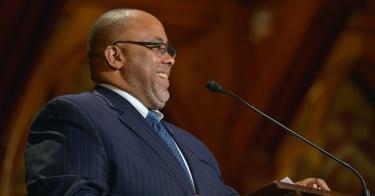“Snitches get stitches” is a threat typically made by adolescents to avoid punishment by intimidating those who might expose their misdeeds. Yet it seems Harvard is a glorified junior high these days, with Lawrence Bobo, its dean of social sciences, threatening faculty who publicly criticize the university for its mistreatment of Jewish students.
Writing in the Crimson, Bobo argued that it is “outside the bounds of acceptable professional conduct for a faculty member to excoriate University leadership, faculty, staff, or students with the intent to arouse external intervention into University business.”
Faculty who appeal to external actors to reverse gross injustices at Harvard may not get literal stitches, but Bobo could deny them tenure or lower their pay. His piece has not been made official Harvard policy, but more senior administrators have not repudiated his interpretation of “acceptable professional conduct,” and his discretion to punish snitches remains intact.
>>> Harvard Takes a Small Step Forward
Bobo’s hostility to “external intervention” is reminiscent of something more menacing than junior high taunts about snitches. It echoes George Wallace’s complaints about “outside agitators.” The segregationist governor of Alabama claimed in a 1964 letter that efforts by him and other Southern leaders to improve the condition of the “Negro citizen” were being undermined by “the national news media and the propaganda distributed by various organizations.” If only outside agitators would avoid stirring up trouble, both “white and colored” could continue to live in “peace and equanimity.”
Bobo similarly expresses a preference for managing Harvard’s problems through “internal discussion on key policy matters,” threatening to sanction “behaviors that plainly incite external actors—be it the media, alumni, donors, federal agencies, or the government—to intervene in Harvard’s affairs.” It’s as if Bobo were saying that Harvard’s Jews could be living in “peace and equanimity” without outside agitators in the media and government stirring up trouble.
Bobo and other Harvard leaders are right to fear outside intervention. Despite its more than $50 billion endowment, Harvard is a financial house of cards built on government subsidy and donor largesse. Harvard’s operating budget last year was $5.9 billion, of which about $650 million came from federal research grants, $55 million came from government student aid and loans, and another $500 million came from the “current use” gifts of donors.
If Harvard’s misdeeds were to motivate the federal government to remove its eligibility for research grants and student assistance, and donations were to dry up, Harvard would be facing the loss of about a fifth of the revenue it needs to cover its operating costs. Harvard has been so flush with cash for so long that it has no idea how to cut 1% of its budget, let alone 20%.
A future Republican, or for that matter Democratic, administration cutting off its access to federal funds alongside a donor strike would be financially catastrophic for Harvard at the same time that it would be enormously politically popular. Stopping the gush of federal money into Harvard would spell the end for Bobo and his colleagues, just as sending the National Guard to Little Rock Central spelled the end for Arkansas Gov. Orval Faubus’s political ambitions.
>>> DEI Doesn’t Work, Evidence Shows
In his Crimson piece, Bobo emphasizes that students “must also learn from the example of heroic figures like the Rev. Dr. Martin Luther King Jr.” Bobo himself might benefit from rereading King’s “Letter from a Birmingham Jail.” In that letter, King rejects the notion that “outside agitators” are somehow illegitimate, noting, “Never again can we afford to live with the narrow, provincial ‘outside agitator’ idea. Anyone who lives inside the United States can never be considered an outsider anywhere within its bounds.”
Similarly, no external policymaker, reporter, or donor is an “outsider” regarding Harvard’s mistreatment of its Jewish students, not to mention professors of all faiths, who suffer under administrators such as Bobo who have made Harvard America’s worst university for free speech.
Harvard is facing a reckoning. Bobo is trying to stave off that reckoning by intimidating faculty critics into silence. It’s too late. Even Harvard does not have a large enough endowment to avoid the consequences of getting on the wrong side of a critical mass of policymakers and donors.
This piece originally appeared in the Washington Examiner



